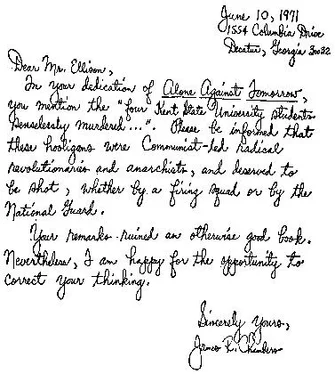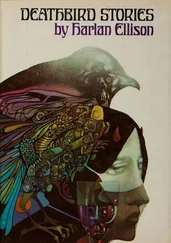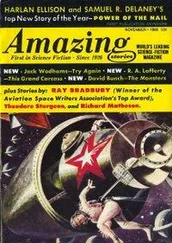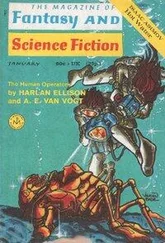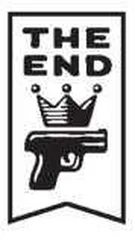With the sound of death still echoing, Joe Bob Hickey ran down the length of the gully, into the woods, and gone.
It has been said before, and will be said again, but never as simply or humanely as Thoreau said it: "He serves the state best, who opposes the state most."
(Aluminum acetate, a chemical compound which, in the form of its natural salt, Al(C2H3O2)3, obtained as a white, water-soluble amorphous powder, is used chiefly in medicine as an astringent and as an antiseptic. In the form of its basic salt, obtained as a white, crystalline, water-insoluble powder, it is used chiefly in the textile industry as a waterproofing agent, as a fireproofing agent, and as a mordant. A mordant can be several things, two of the most important being an adhesive substance for binding gold or silver leaf to a surface; and an acid or other corrosive substance used in etching to eat out the lines.)
Joe Bob Hickey as aluminum acetate. Mordant. Acid etching at a corroded surface.
Deep night found him in terrible pain, far from the burning ruin of the University. Stumbling beneath the gargantuan Soleri pylons of the continental tramway. Falling, striking, tumbling over and over in his stumble. Down a gravel-bed into deep weeds and the smell of sour creek. Hands came to him in the dark, and turned him face-up. Light flickered and a voice said, “He's bleeding,” and another voice, cracked and husky, said, “He's sideing a squirter,” and a third voice said, “Don't touch him, come on,” and the first voice said again, “He's bleeding,” and the light was applied to the end of a cigar stub just as it burned down. And then there was deep darkness again.
Joe Bob began to hurt. How long he had been hurting he didn't know, but he realized it had been going on for some time. Then he opened his eyes, and saw firelight dancing dimpling dimly in front of him. He was propped up against the base of a sumac tree. A hand came out of the mist that surrounded him, seemed to come right out of the fire, and a voice he had heard once before said, “Here. Take a suck on this.” A plastic bottle of something hot was held to his lips, and another hand he could not see lifted his head slightly, and he drank. It was a kind of soupness that tasted of grass.
But it made him feel better.
“I used some of the shpritz from the can in your knapsack. Something got you pretty bad, fella. Right across the back. You was bleeding pretty bad. Seems to be mending okay. That shpritz.”
Joe Bob went back to sleep. Easier this time.
Later, in a softer, cooler time, he woke again. The campfire was out. He could see clearly what there was to see. Dawn was coming up. But how could that be...another dawn? Had he run all through the day, evading the varks sent to track him down? It had to be just that. Dawn, he had been crouched outside the fence, ready to trip the charges. He remembered that. And the explosions. And the squirt team, and the chopper, and
He didn't want to think about things falling out of the sky, burning, sparking.
Running, a full day and a night of running. There had been pain. Terrible pain. He moved his body slightly, and felt the raw throb across his back. A piece of the burning chopper must have caught him as he fled; but he had kept going. And now he was here, somewhere else. Where? Filtered light, down through cool waiting trees.
He looked around the clearing. Shapes under blankets. Half a dozen, no, seven. And the campfire just smoldering embers now. He lay there, unable to move, and waited for the day.
The first one to rise was an old man with a dirty stipple of beard, perhaps three days' worth, and a poached egg for an eye. He limped over to Joe Bob-who had closed his eyes to slits-and stared at him. Then he reached down, adjusted the unraveling blanket, and turned to the cooling campfire.
He was building up the fire for breakfast when two of the others rolled out of their wrappings. One was quite tall, wearing a hook for a hand, and the other was as old as the first man. He was naked inside his blankets, and hairless from head to foot. He was pink, very pink, and his skin was soft. He looked incongruous : the head of an old man, with the wrinkled, pink body of a week-old baby.
Of the other four, only one was normal, undamaged. Joe Bob thought that till he realized the normal one was incapable of speech. The remaining three were a hunchback with a plastic dome on his back that flickered and contained bands of color that shifted and changed hue with his moods; a black man with squirt burns down one entire side of his face, giving him the appearance of someone standing forever half in shadow; and a woman who might have been forty or seventy, it was impossible to tell, with one inch wide window strips in her wrists and ankles, whose joints seemed to bend in the directions opposite normal.
As Joe Bob lay watching surreptitiously, they washed as best they could, using water from a Lister bag, avoiding the scum-coated and bubbling water of the foul creek that crawled like an enormous gray potato slug through the clearing. Then the old man with the odd eye came to him and knelt down and pressed his palm against Joe Bob's cheek. Joe Bob opened his eyes.
“No fever. Good morning.”
“Thanks,” Joe Bob said. His mouth was dry.
“How about a cup of pretty good coffee with chicory?” The old man smiled. There were teeth missing.
Joe Bob nodded with difficulty. “Could you prop me up a little?”
The old man called, “Walter...Marty...” and the one who could not speak came to him, followed by the black man with the half-ivory face. They gently lifted Joe Bob into a sitting position. His back hurt terribly and every muscle in his body was stiff from having slept on the cold ground. The old man handed Joe Bob a plastic milk bottle half-filled with coffee. “There's no cream or sugar, I'm sorry,” he said. Joe Bob smiled thanks and drank. It was very hot, but it was good. He felt it running down inside him, thinning into his capillaries.
“Where am I? What is this place?”
“N'vada,” said the woman, coming over and hunkering down. She was wearing plowboy overalls chopped short at the calves, held together at the shoulders by pressure clips.
“Where in Nevada?” Joe Bob asked.
“Oh, about ten miles from Tonopah.”
“Thanks for helping me.”
“I dint have nothin' to do with it at all. Had my way, we'd've moved on already. This close to the tramway makes me nervous.”
“Why?” He looked up; the aerial tramway, the least impressive of all Paolo Soleri's arcologies, and even by that comparison breathtaking, soared away to the horizon on the sweep-shaped arms of pylons that rose an eighth of a mile above them.
“Company bulls, is why. They ride cleanup, all up'n down this stretch. Lookin' for sabooters. Don't like the idea them thinkin' we's that kind.”
Joe Bob felt nervous. The biggest patriots were on death row. Rape a child, murder seven women, blow the brains out of an old shopkeeper, that was acceptable; but be anti-country and the worst criminals wanted to wreak revenge. He thought of Greg, who had been beaten to death on Q's death row, waiting on appeal, by a vark-killer who'd sprayed a rush hour crowd with a squirter, attempting to escape a drugstore robbery that had gone sour. The vark-killer had beaten Greg's head in with a three-legged stool from his cell. Whoever these people were, they weren't what he was.
“Bulls?” Joe Bob asked.
“How long you been onna dodge, boy?” asked the incredibly tall one with the hook for a hand. “Bulls. Troops. The Man.”
The old man chuckled and slapped the tall one on the thigh. “Paul, he's too young to know those words. Those were our words. Now they call them...”
Joe Bob linked in to the hesitation. “Varks?”
Читать дальше
